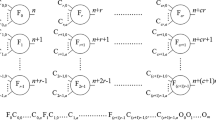Abstract
We describe an implementation of a genetic algorithm on partially commutative groups and apply it to the double coset search problem on a subclass of groups. This transforms a combinatorial group theory problem to a problem of combinatorial optimisation. We obtain a method applicable to a wide range of problems and give results which indicate good behaviour of the genetic algorithm, hinting at the presence of a new deterministic solution and a framework for further results.
Preview
Unable to display preview. Download preview PDF.
Similar content being viewed by others
References
Booth, R.F., Bormotov, D.Y., Borovik, A.V.: Genetic Algorithms and Equations in Free Groups and Semigroups. Contemp. Math. 349, 63–80 (2004)
Borovik, A.V., Esyp, E.S., Kazatchkov, I.V., Remeslennikov, V.N.: Divisibility Theory and Complexity of Algorithms for Free Partially Commutative Groups. Contemp. Math. 378 (Groups, Languages, Algorithms) (2005)
Bremermann, H.J.: Optimization Through Evolution and Recombination. In: Yovits, M.C., et al. (ed.) Self-Organizing Systems, pp. 93–106. Spartan Books, Washington (1962)
Holland, J.: Adaptation in Natural and Artificial Systems (5th printing). MIT Press, Cambridge (1998)
Ko, K.-H.: Braid Group and Cryptography. 19th SECANTS, Oxford (2002)
Knuth, D., Bendix, P.: Simple Word Problems in Universal Algebra, Computational Problems in Abstract Algebras. In: Leech, J. (ed.), pp. 263–297. Pergamon Press, Oxford (1970)
Miasnikov, A.D.: Genetic Algorithms and the Andrews-Curtis Conjecture. Internat. J. Algebra Comput. 9(6), 671–686 (1999)
Miasnikov, A.D., Myasnikov, A.G.: Whitehead Method and Genetic Algorithms. Contemp. Math. 349, 89–114 (2004)
Michalewicz, Z.: Genetic Algorithms + Data Structures = Evolution Programs, 3rd edn. Springer, Berlin (1996)
VanWyk, L.: Graph Groups are Biautomatic. J. Pure Appl. Algebra 94(3), 341–352 (1994)
Vershik, A., Nechaev, S., Bikbov, R.: Statistical Properties of Braid Groups in Locally Free Approximation. Comm. Math. Phys. 212, 59–128 (2000)
Wrathall, C.: The Word Problem for Free Partially Commutative Groups. J. Symbolic Comp. 6, 99–104 (1988)
Wrathall, C.: Free partially commutative groups, Combinatorics, Computing and Complexity (Tianjing and Beijing, 1988). In: Math. Appl. (Chin. Ser. 1), pp. 195–216, Kluwer Acad. Publ., Dordrecht (1989)
Author information
Authors and Affiliations
Editor information
Rights and permissions
Copyright information
© 2007 Springer Berlin Heidelberg
About this paper
Cite this paper
Craven, M.J. (2007). Genetic Algorithms for Word Problems in Partially Commutative Groups. In: Cotta, C., van Hemert, J. (eds) Evolutionary Computation in Combinatorial Optimization. EvoCOP 2007. Lecture Notes in Computer Science, vol 4446. Springer, Berlin, Heidelberg. https://doi.org/10.1007/978-3-540-71615-0_5
Download citation
DOI: https://doi.org/10.1007/978-3-540-71615-0_5
Publisher Name: Springer, Berlin, Heidelberg
Print ISBN: 978-3-540-71614-3
Online ISBN: 978-3-540-71615-0
eBook Packages: Computer ScienceComputer Science (R0)




